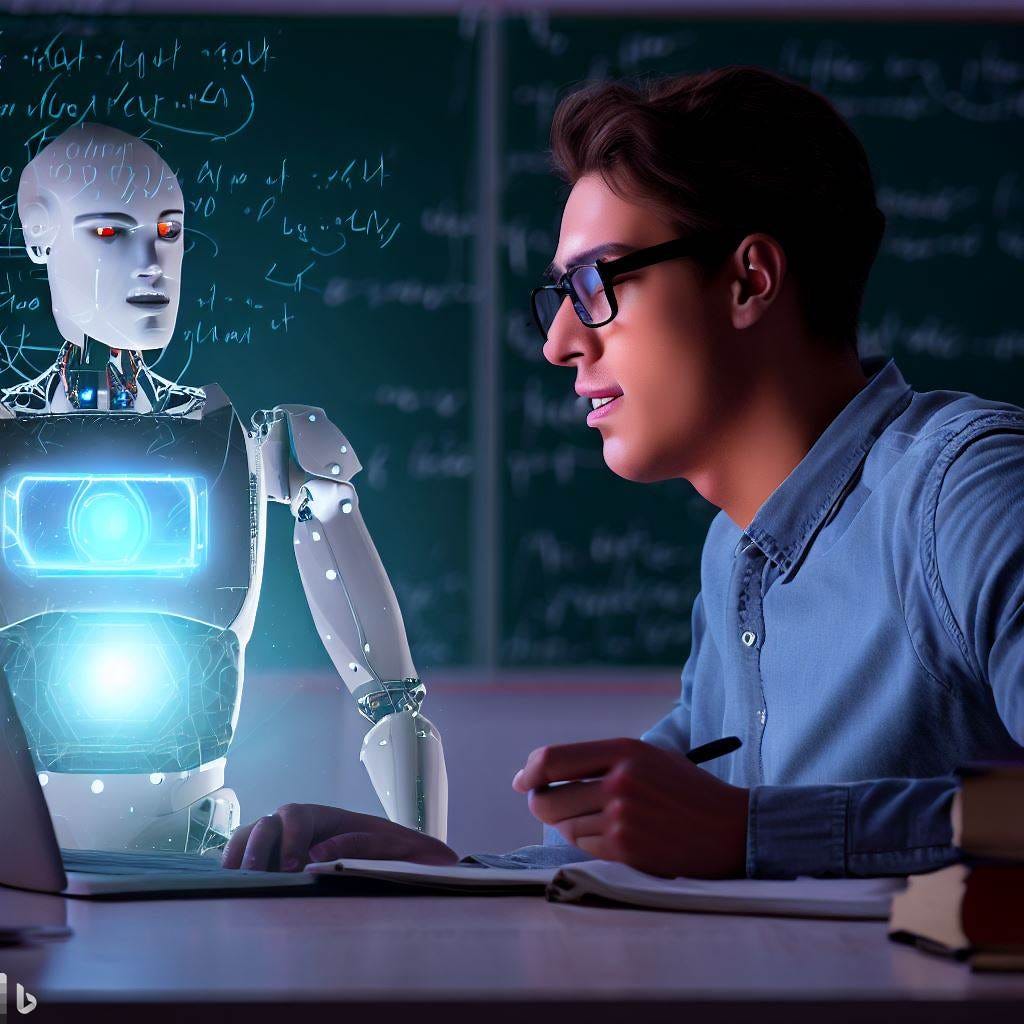How Generative A.I. Is Transforming Ed-Tech
🎓 AI enables entirely new forms of instruction – from adaptive tutors to intelligent assessment 🌱
Friends,
If you know me, you’ll know that I have a huge interest in promoting writers from all parts of the world. Bechem Ayuk from Cameroon has impressed me with his insights in Educational technology. As a consultant and and web developer he specializes in helping educational institutions leverage technology strategically to empower educators and activate the potential in every student.
In Africa, I believe Generative A.I. in education is going to be a big deal! His publication is called The Value Junction. His forward looking insights give us clues to the future of the world at the crossroads of technology and education where young entrepreneurs of developing countries, in places like India, South-East Asia and Africa will lead to better outcomes in education, new advances in the classroom and new kinds of Generative A.I. tutors and technological empowerment.
If you value the diversity and range of topics of this publication, kindly support the channel. To access our exclusive deep dives, start a free trial.
By Bechem Ayuk , an Award Winning Ed-Tech consultant. 🌍 The Value Junction
Contributing Author’s Top Posts
Bechem’s Newsletter in just four months has provided dozens of tangible tips on how to integrate technology and A.I. into the classroom. The potential of artificial intelligence to aid teachers, tutors and students is a generational opportunity for creating value in our societies.
“In the age of AI, our greatest challenge is not to teach students how to answer questions but to inspire them to question answers.” - Bechem Ayuk

September, 2023.
How Generative A.I. Is Transforming Ed-Tech
Introduction
Forget tablets and laptops – the most disruptive classroom technology has no physical form. It can't be touched or held, yet its impact on education will soon be undeniable. I'm talking about artificial intelligence (AI).
When envisioning the future of classroom tech, sleek gadgets like VR headsets come to mind. But AI's potential is less flashy yet more profound. Rather than digitizing traditional learning, AI enables entirely new forms of instruction – from adaptive tutors to intelligent assessment. It doesn't just put a high-tech spin on the status quo – it reimagines learning altogether.
Think about it this way - tablets simply provided digital textbooks and laptops enabled online versions of familiar in-class activities. Useful but not groundbreaking. AI goes further by actually transforming the role of teachers, customizing curriculum to each student, providing personalized tutoring, and generating data-driven insights impossible for humans alone.
Imagine this: a teacher who never sleeps, tirelessly crafting personalized lesson plans for each student, adapting to their unique strengths and weaknesses. Picture a tool that can generate educational content, from essays to math problems, on demand, relieving educators of the burden of endless grading. It might sound like science fiction, but it's the reality that generative AI is bringing to our classrooms today.
In fact, as I’ll explore next, pioneering schools worldwide have already begun leveraging AI to enhance nearly every facet of education. Their implementations illuminate how artificial intelligence can unlock deep insights and previously unimaginable possibilities when thoughtfully integrated.
Case Studies of AI Being Used to Transform Education
Enhancing Literacy in India: AI-Powered Reading Companions
In India, an innovative program named ReadToMe is making strides. This AI-powered platform assists children in improving their reading skills by providing text-to-speech technology that can read aloud any text in multiple languages. This empowers students to practice reading even when they don't have access to a human tutor. As a result, children in remote areas are gaining essential literacy skills, bridging the educational divide. It recorded a 20–40% overall gain in learning outcomes in 2021 according to this study.
Using AI to detect guns in American schools
Schools across the United States, including Cocos Valley Regional High School in New Jersey, have adopted cutting-edge AI technology called Zero Eyes to enhance security measures. Zero Eyes is a human-verified artificial intelligence system designed to detect firearms and prevent potential mass shootings. It works by integrating with existing security camera systems and employing AI algorithms trained to identify guns. What sets it apart is its real-time monitoring conducted by a team of military experts who work to alert authorities before any shots are fired. This proactive approach is crucial, given that 60% of active shooter events ends before law enforcement arrives, according to the FBI.
Picture of ZeroEyes detecting a fake gun during one of their demos. Source
AI as a grading assistant in Singapore
Traditionally, grading exam papers has been a laborious and error-prone task for educators. It involves the cumbersome process of manually reviewing stacks of papers, which can be both time-consuming and prone to human errors, particularly when tallying scores for each question.
To streamline this process and address its inherent challenges, the AI Centre for Educational Technologies(AICET) has introduced a solution called the SoftMark program. This innovative system leverages the power of AI, specifically a technology known as Computer Vision, which enables devices to interpret and extract meaningful information from images.
Here's how SoftMark revolutionizes grading: Instead of manually poring over physical exam scripts, teachers can simply scan them. The AI embedded within SoftMark is capable of identifying where students have provided their answers on the scripts. Teachers can then proceed to grade these papers using a tablet, while the AI automatically calculates scores for each question in real-time as they are being assessed.
AI’s Untapped Potential
All the examples above show the huge potential AI has in making education better. But here are three creative and innovative ways I think AI can be used in education which I haven’t seen anywhere, including one futuristic concept that pushes the boundaries of what's currently possible:
1. AI-Powered Digital Storytellers:
Imagine AI-driven digital storytellers that create immersive and interactive educational narratives. These digital companions could guide students through history, science, literature, and various subjects by turning learning into an engaging adventure. AI would craft dynamic narratives, adapting to each student's interests, learning style, and progress.
How it works: AI algorithms would analyze students' preferences, academic performance, and even physiological responses to gauge engagement levels. The digital storyteller would then modify the storyline, characters, and challenges in real time. For instance, in a history lesson(history was my favourite subject back in high school), the AI might create a scenario where students play a role in pivotal historical events, making learning history a captivating journey rather than a memorization task. If this had been done when I was in high school, I would have loved to play the role of Captain Thomas Sankara - he is my role model.
Benefits: This approach capitalizes on AI's adaptability and personalization capabilities, making learning enjoyable and effective. It leverages AI's real-time monitoring to provide educators with valuable insights into students' engagement and comprehension.
2. AI-Enhanced Emotional Intelligence Development:
AI can play a significant role in nurturing emotional intelligence (EQ) in students. AI-powered virtual mentors or counsellors would interact with students to help them understand and manage their emotions, develop empathy, and build healthy relationships. These AI companions would provide a safe space for students to express themselves without judgment.
How it works: AI would use natural language processing to understand and respond to students' emotional states, providing guidance and support accordingly. It could simulate scenarios to help students practice empathy, conflict resolution, and emotional regulation.
Benefits: Enhancing emotional intelligence is crucial for personal and professional success. AI-driven emotional intelligence development can complement traditional education, fostering well-rounded individuals who are not only academically proficient but also emotionally resilient and socially adept. More schoolchildren today are depressed than ever before. Why don’t we try using AI to solve this problem?
3. Quantum AI Tutors: (Futuristic Concept)
In the realm of the future, we can envision quantum AI tutors that leverage the immense computing power of quantum computers. These tutors would tackle the most complex problems and theories in subjects like quantum physics, advanced mathematics, and theoretical sciences.
How it works (Futuristic): Quantum AI would harness quantum computing's potential to process vast amounts of data and perform calculations at speeds unattainable by classical computers. It would enable students to explore cutting-edge scientific concepts in a highly interactive and intuitive manner. Visualizing quantum phenomena and conducting complex simulations would become routine educational experiences.
Benefits (Futuristic): This futuristic application of AI in education would democratize access to advanced knowledge, breaking down barriers for students interested in exploring the frontiers of science. It would accelerate research and innovation in scientific fields and prepare future generations for challenges that require quantum literacy.
These creative applications of AI in education not only capitalize on the technology's capabilities but also aim to enhance learning experiences in unprecedented ways. While the third concept may seem futuristic, it highlights the limitless possibilities AI can offer in shaping the future of education.
Why is AI so disruptive?
Many technologies have come before AI but none has proven to be as disruptive as AI. But why? I want to try and answer this question by examining the unique qualities that set AI apart from previous technologies and as a lover of human psychology, also explore the underlying human behaviours driving its adoption.
Unique Qualities of AI in Education
1. Adaptability and Personalization:
Unlike traditional technologies, AI possesses the remarkable ability to adapt and personalize educational content. This adaptability stems from machine learning algorithms that analyze individual learning patterns. The uniqueness here lies in AI's capability to customize learning experiences for each student, catering to their specific strengths and weaknesses. This level of personalization is akin to having a personal tutor for every learner in the classroom, a feat previously unattainable.
2. Data-Driven Insights:
AI excels in collecting and analyzing vast amounts of data. This data-driven approach provides educators with deep insights into student performance, learning trends, and areas that need improvement. The key distinction is that AI goes beyond simply collecting data; it transforms it into actionable insights, empowering educators to make informed decisions.
3. Scalability and Accessibility:
AI-driven educational tools are highly scalable, enabling institutions to reach a broader audience. Unlike traditional classroom settings, where scalability is constrained by physical limitations, AI transcends these boundaries. It aligns with the principles of accessibility and inclusivity, ensuring that quality education reaches remote and underserved regions.
Human Behaviors Driving AI Adoption in Education
1. Desire for Personalization:
Human behaviour is driven by a desire for personalized experiences. This aligns with the psychological theory of self-determination, where individuals seek autonomy, competence, and relatedness. AI's personalization satisfies these needs by allowing students to take ownership of their learning, feel competent, and connect with the educational material on a personal level.
Self-determination Theory. Source
2. The Need for Efficiency:
Humans naturally seek efficiency in their tasks. The concept of cognitive load theory in psychology explains that individuals have limited cognitive resources. AI's ability to automate routine tasks such as grading and administrative work resonates with this need for efficiency, allowing educators to focus more on teaching and less on administrative burdens.
3. Data-Driven Decision-Making:
Humans are influenced by data and evidence. Cognitive dissonance theory suggests that when faced with conflicting information, individuals seek to resolve the dissonance. AI's provision of data-driven insights aligns with this behaviour, helping educators make more informed decisions based on objective evidence.
What We Shouldn’t Be Worried About
AI-Facilitated Cheating
The concern about AI-facilitated cheating should be viewed in perspective, as cheating itself has been a persistent issue throughout the evolution of education. This was the main reason why many schools banned AI after ChatGPT was released and some erroneously tried to use AI to detect AI. The advent of AI and the internet did bring new avenues for cheating, but they also present opportunities to reshape our approach to assessment.
Firstly, it's essential to recognize that cheating is not a novel phenomenon introduced by AI; it has existed long before the digital age. In Kenya, around 20,000 individuals were earning a living by writing essays before AI, while 15% of students worldwide had paid someone to complete their assignments by 2017. Students have always sought ways to circumvent the system, whether it was copying from a classmate's paper or using printed cheat sheets. The introduction of Google and internet resources merely expanded the toolbox available to students. AI-enabled cheating is, in many ways, an extension of this trend.
We should focus on evolving our assessment methods, rather than fixating on the fear of cheating. Performance-based assessments offer a promising alternative. These assessments gauge students' practical application of knowledge, critical thinking, problem-solving, and creativity. Unlike traditional exams, which can be easily cheated using AI or other means, performance-based assessments are inherently resistant to cheating. They require students to demonstrate their understanding by actively applying what they've learned to real-world scenarios.
Performance-based assessments are invincible to cheating because they demand a deep understanding of the subject matter and practical skills that cannot be replicated through shortcuts or online resources. They encourage students to engage with the material actively and develop a mastery of the content. This shift in assessment not only mitigates cheating concerns but also better prepares students for the challenges they will face in their future careers, where practical application of knowledge is paramount.
Moreover, performance-based assessments foster a more holistic and authentic learning experience. They encourage collaboration, critical thinking, and creativity, aligning with the skills needed in the modern workforce. As educators increasingly adopt these methods, the emphasis shifts from memorization to understanding, application, and innovation.
AI-facilitated cheating is a legitimate concern, but it shouldn't overshadow the opportunity it presents to revolutionize assessment practices. Performance-based assessments are not only immune to cheating but also provide a more meaningful and comprehensive measure of a student's abilities. Embracing this shift in assessment can create a more equitable and authentic education system, where students are better equipped for the demands of the future.
What We Should Be Worried About
The impending wave of AI and automation-driven job creation poses a significant challenge for our education systems. 2 in 3 grade 6 children will work in jobs that don't even exist yet. This was one of the key points in Mustafa Suleyman’s recent article where he talked about how AI is going to redistribute power and change the order of how the world operates. The concern lies in the potential mismatch between our current education curricula and the skills needed to thrive in these evolving professions. Here's why we should worry and how we can address this pressing issue:
1. Skills Gap and Job Market Disruption:
The pace of technological advancement, especially in AI and automation, is outstripping our ability to prepare students adequately. As new industries emerge and existing ones transform, the skills required for these jobs are constantly evolving.
2. Economic and Social Implications:
The mismatch between education and job requirements could have profound economic and social consequences. It may exacerbate income inequality, as those with outdated skills struggle to find well-paying work.
How do we address this issue?
To tackle this challenge, education systems must undergo a fundamental transformation. We must prioritize adaptability and lifelong learning in our education systems. Here's how we can do it:
Curriculum Modernization: Education curricula need to be updated regularly to reflect the changing demands of the job market. Incorporating subjects like AI literacy, digital skills, and critical thinking will be crucial.
Emphasis on Soft Skills: Alongside technical skills, fostering soft skills like adaptability, communication, and problem-solving is essential. These skills are transferable across industries and can help individuals navigate career shifts.
Lifelong Learning Culture: Encouraging a culture of lifelong learning is vital. This includes promoting continuous skill development, offering affordable upskilling and reskilling opportunities, and recognizing the value of informal learning experiences.
Partnerships with Industry: Collaboration between educational institutions and industry stakeholders can ensure that education remains relevant to the job market. Internships, apprenticeships, and work-study programs can bridge the gap between theory and practice.
Preparing students for an uncertain future job market is not just a matter of education; it's a societal imperative that requires a holistic approach to equipping the next generation with the skills and mindset to thrive in a world where change is the only constant. The key is to embrace change and equip our students with the skills they need to thrive in an ever-evolving world.
A Generational Opportunity for Educational Empowerment
In this educational revolution, AI serves as a powerful ally, enabling personalized and adaptive learning experiences. It addresses the pressing need to prepare students for a rapidly changing job market, where adaptability and lifelong learning are paramount.
The classroom of the future is taking shape today, guided by AI's adaptability, data-driven insights, and scalability. It's a future where education is more student-centric, efficient, and aligned with the dynamic demands of the modern world. AI is not the end of education; it's a new beginning—a journey where every student is the hero of their own personalized story.
In the age of AI, our greatest challenge is not to teach students how to answer questions but to inspire them to question answers.
Biography
Bechem Ayuk is a 21-year-old award-winning edtech consultant, newsletter author, and web developer. As an edtech consultant, he helps educational institutions effectively use technology for teaching and learning by offering services like teacher training, guiding the development and implementation of edtech strategies, as well as creating appealing websites for these institutions to establish a digital presence.
Bechem is the author of "The Value Junction," a curated collection of practical tips and valuable insights from the world of edtech. His newsletter, "The Value Junction," is read in 29 countries worldwide, reflecting the global impact of his work in educational technology.
Editor’s Additional Insights
By AI Supremacy ‘s Michael Spencer.
Kindly find ways to support Bechem, if you see the value of this young consultant. I have been immensely impressed by his professionalism, the scope of his activities and the quality of his publication.
Communications: bechemfabrice47@gmail.com
WhatsApp: +237 6 53 87 39 88
Why is Africa Important for the Future of Artificial Intelligence?
As many developing countries will face rapidly aging societies and economies that will be stagnating, Africa will have different issues and extraordinary potential in its talent. Africa is the continent with the youngest population worldwide. As of 2022, around 40 percent of the population was aged 15 years and younger, compared to a global average of 25 percent. Although the median age on the continent has been increasing annually, it remains low at around 20 years.
As we have seen with the 2023 wave of Generative A.I., it’s young people who are the main and early adopters of ChatGPT and related chatbots, conversational agents and A.I. tools. This means many of the world’s future entrepreneurs actually come from places like India, Africa, South-East Asia and South America.
The population of Africa is nearing 1.4 Billion. How will artificial intelligence enable economic growth and GDP increases among Africa’s strongest economies? A.I. in education has a huge potential to help uplift millions of people and create extraordinary economic value in places like Nigeria, India, Indonesia, among others that will drive global economic growth into the 2030s and 2040s. Nigeria itself has over 15% of the population of Africa.
If the age of AI has begun, what will be Africa’s role in this new world?
Some analysts believe that by 2100, Africa will be home to 50% of the world’s young population and 33% of the total population of planet Earth. Think about what that means for the future of human civilization.
Nigeria in particular, could become increasingly important as a center of global innovation. According to recent UN projections, Nigeria will nearly double its population again by 2050 to an estimated 377 to 400 million. In the process, the country will leapfrog Pakistan and Indonesia and end up in a virtual tie with the US as the third most populous country in the world.
Platforms like Substack have the potential to impact new media and the spread of ideas in Africa.
Thanks for reading!












